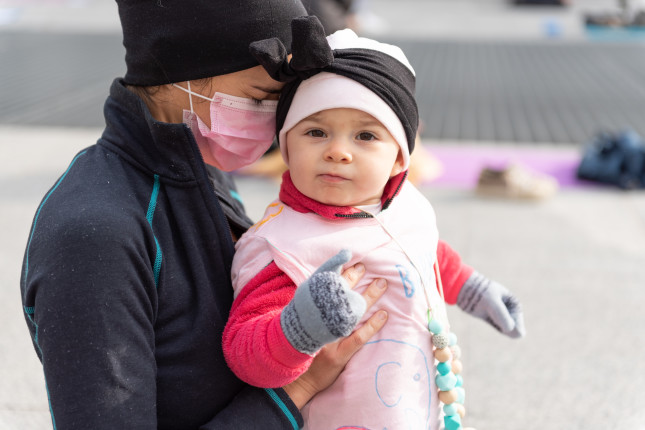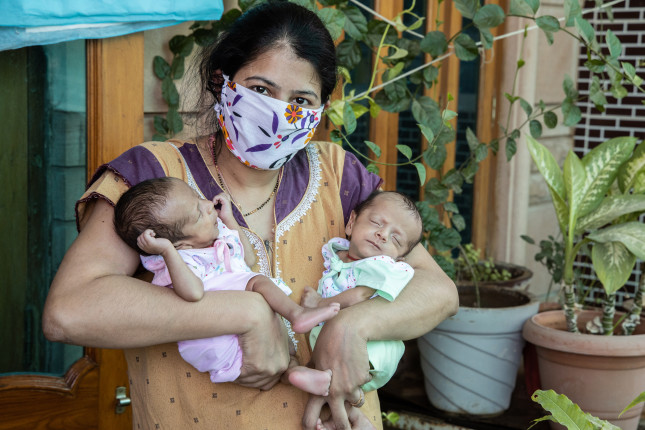-
Shaping a Maternal Mental Health Crisis Response to COVID-19

As the number of confirmed COVID-19 cases and deaths rise, women are experiencing more anxiety both during and after pregnancy. One-third of all mental health problems are associated with adverse childhood and community experiences—the pandemic is an adverse community experience being felt worldwide.
The pandemic has created a mental health crisis for women and girls. And the problems that arise come in many forms, with implications for both mental and physical health. The ensuing restrictions and lockdowns have led to severe mental health problems in pregnant women and rising teen pregnancies, which can also lead to increased stress and anxiety, because of physical and psychological vulnerability, restricted autonomy, and limited access to essential resources like food and healthcare. In Kenya, as availability of birth control and sex education dissemination fell, unwanted teenage pregnancies and sexual violence against women and girls rose. More than 2 million unwanted pregnancies will occur in India during the pandemic, according to United Nations Population Fund (UNFPA) estimates, with likely increases in women accessing unsafe abortions. Research shows that women who continue unwanted pregnancies face an increased risk of complications during pregnancy and increased risk of postpartum depression, which can lead to negative health outcomes for women globally, especially in low-and middle-income countries (LMICs).
Intimate partner violence (IPV)—emotional, physical, or sexual abuse by an intimate partner—which has an estimated lifetime prevalence of 30 percent globally (23 percent in high-income countries and 38 percent in LMICs), has increased during the pandemic and ensuing lockdowns. Although sexual violence has often been harder to report during the pandemic, available evidence indicates greater than average frequency since the beginning of the lockdown. In Bangladesh, rates of depression among women who experienced IPV were between 2.0 to 2.3 times higher than among women who have not.
Depression and anxiety are not the only psychological disorders heightened by the pandemic. Attention-deficit hyperactivity disorder (ADHD) and substance use are also devastating teenagers and families. In the United States, research shows that the longer the pandemic stretches, the higher the rates of alcohol consumption, substance use, and mental health conditions among American adults.
During the pandemic, it has also been hard for women to get the care they need. Local health workers in rural India have found it increasingly difficult to provide essential antenatal and postnatal care to pregnant women during lockdowns. This situation is exacerbated by the limited number of clinicians who provide COVID-19 related services. Furthermore, enforced physical distancing has made it impossible to deliver maternal care services that often were provided in group settings in rural villages.
Learning from Existing Community Interventions
Global investment in maternal mental health at the grassroots level is more crucial than ever to address these intersectional issues and drive multilevel prevention efforts in early pregnancy. These prevention efforts must be culturally and contextually sensitive to ensure adoption, sustainability, and impact. Interventions can be adapted to meet the diverse needs of mothers and other caregivers globally, regardless of age, sex, gender, ethnic background, socioeconomic status, immigration status, or strength of the clinical mental health system.
There is growing recognition that mental health is a vital component of humanitarian response in times of crisis, with the greatest needs often among women. The World Health Organization (WHO) recommends that crises, including the current pandemic, be taken as opportunities to build sustainable community-level mental health programs that address the diverse needs of the most vulnerable groups. A leading example is the comprehensive community-based mental health system Zanmi Lasante developed in Haiti in the years following the 2010 earthquake. Trauma-specific care, as well as a new focus on maternal mental health, are key features of this system of contextualized and sustainable mental health services.
Excellent examples of community-based prevention efforts that target maternal mental health can be found around the world, including in resource-scarce settings like Pakistan and Uganda. Models like Nurturing Care Groups, developed by World Vision, Hesperian, Food for the Hungry, Food Security and Nutrition Network, and World Relief, have shown that even simple, low cost, community-based models addressing maternal mental health can have profound impacts on the health and well-being of both mothers and children. Similarly, low-cost and scalable interventions like WHO’s Problem Management Plus can be deployed in times of crisis and adapted in the local context to address the growing mental health burden of women and other vulnerable groups. Even broader community interventions addressing income or employment gaps during a pandemic could reduce the risk of violence against women and children.

Gender Transformative Approaches for Better Maternal Mental Health
The global pandemic and the associated rise in mental health needs, particularly among women, is an urgent call to develop more comprehensive and accessible maternal mental health services at the grassroots level to unlock girls’ and women’s potential. Multilevel community-based prevention efforts can effectively prevent, mitigate, and treat maternal mental health problems. A gender-transformative approach can further help address these issues through targeted, cost-effective, and long-lasting prevention measures that address social norms, power dynamics, and the need for increased accountability for perpetrators of trauma, neglect, and abuse.
Gender-transformative approaches for tackling maternal mental health issues during this global health emergency can define a sustainable path for the years ahead. They could involve moving toward greater gender equity in the household; teaching teenage boys about gender and sex differences through a highly successful gender transformative curriculum pilot called Manhood 2.0 program by Promundo; and paying and treating community health workers (CHWs) fairly because 70 percent of health and social workers are women.
Strengthening support for CHWs, including those who provide maternal care, will help them prevent and appropriately respond to severe cases of maternal mental health problems such as post-traumatic stress disorder and maternal suicide. As the COVID-19 pandemic and its associated impacts continue to grow, critical global investments in maternal mental health are urgently needed. Action on this long-neglected issue is more crucial than ever.
Madhavi Roy (she/her) is a Research and Network Coordinator at the Addictions Research Group, Sangath, India, where she works in research on mental health & COVID-19, and substance use among young people.
Paul Shetler Fast serves as Global Health Coordinator for Mennonite Central Committee and specializes in locally contextualized community-based public health efforts in the areas of mental health, sexual and gender-based violence, and maternal and child health.
Sources: BMC Pregnancy Childbirth, British Journal of Psychiatry, Center for Global Development, Children and Adults with Attention-Deficit/Hyperactivity Disorder, Deutsche Welle, Elsevier BV, Europe PMC, Firstpost, Food for the Hungry, Global Mental Health, Global Nutrition Report, Harvard Business Review, International Labour Organization, International Planned Parenthood Federation, Kaiser Family Foundation, Lancet Psychiatry, New England Journal of Medicine, Nurturing Care Groups, Promundo, Psychiatric Research & Clinical Practice, Public Health, The Dibble Institute, The Journal of Maternal-Fetal & Neonatal Medicine, The Lancet Global Health, The MGH Center for Women’s Mental Health, UN, UNFPA, United For Global Mental Health, World Health Organization.
Photo Credits: Mom wearing mask with baby, Olga Litvinova/Shutterstock.com, All Rights Reserved. Young Mother Wearing Mask Holding Her Two Newborn Twin Babies, stockpexel/Shutterstock.com, All Rights Reserved.
 A Publication of the Stimson Center.
A Publication of the Stimson Center.




